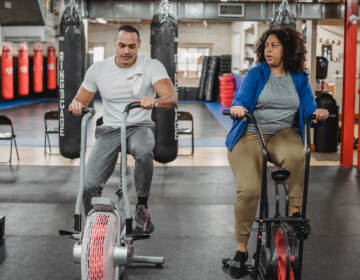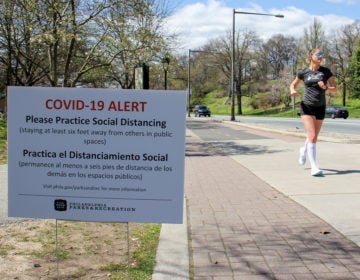How to make — and keep — a new year’s resolution
If you’re planning to make a resolution or two this new year, here are some tips on how to make it stick past January.

Fireworks are launched from a barge in the Delaware River as seen from Penns Landing.(Jonathan Wilson for WHYY)
From Philly and the Pa. suburbs to South Jersey and Delaware, what would you like WHYY News to cover? Let us know!
For people across the world, the new year provides a fresh slate and an opportunity to make resolutions for what they want to accomplish in the next trip around the sun.
On Saturday, visitors and vendors at Philadelphia City Hall’s holiday market cited quitting drinking, going to church more, saving money and growing their business as among their resolutions for 2025.
“I’m gonna give more back, but take more for me time-wise,” Jenn Harris, of Montgomery County, told WHYY News. “I will either volunteer or donate more, and then I will take the small moments and actually enjoy them, instead of kind of letting them slide by.”
New year’s resolutions aren’t anything new. If you’re vowing to run a marathon, learn how to knit or eat healthier in 2025, you’re joining the ranks of medieval knights who renewed their chivalry vows each year. The practice of setting goals at the new year dates as far back as the Ancient Babylonians, who made resolutions for their start of the calendar (which was in March) some 4,000 years ago.
According to a January 2024 report from the Pew Research Center, 30% of American adults made at least one new year’s resolution for 2024. Half of that group made more than one goal for the year ahead. Young adults ages 18-29 were the most likely to make new year’s resolutions, according to the findings.
For those who made resolutions, the report found that health was the top topic, with 79% of those surveyed making resolutions related to health, exercise and/or diet. Other leading areas of interest were money and finances, personal relationships, hobbies or personal interests, and work or career.
Katy Milkman, a professor at University of Pennsylvania’s Wharton School of Business and author of “How to Change,” told WHYY News that there’s nothing “magic” about New Year’s Day, but the date does include a couple of factors that could help make your resolution a reality.
To begin with, Milkman said, setting a goal is an important first step that can lead to behavioral change.
“We have lots of research showing that when we set goals, it improves the likelihood that we will up our achievement,” she said. “So goal setting is a very effective way of boosting performance.”
According to Milkman, Jan. 1 isn’t necessarily a better time to set a goal than any other date in the calendar, but it does give us an advantage because we view new year’s as a fresh start.
“Anytime we’re starting something new, we have a sense that it is a good time to set goals and start fresh,” she said.
Those new beginnings could also be the start of an academic semester, a birthday or even a job promotion.
“We don’t think about time continuously,” Milkman said. “We think about our lives like we’re characters in a book and there are these chapter breaks in our lives.”
That “chapter break” gives us an opportunity to look back, reassess and move toward new goals with “extra optimism,” according to Milkman.
“That psychological distancing, the fact that we think about time with these discontinuities, instead of thinking of it as a linear experience, gives us the added motivation to set goals,” she said.
But what happens after you set a goal and the initial new year’s sparkle wears off in the drab gray of February and muddy Ides of March?
That’s where Milkman focuses her research. If you’re planning to make a resolution or two this new year, here are some tips on how to make it stick past January.
Conduct a pre-mortem
A pre-mortem, said Milkman, is a way to assess beforehand what obstacles could derail you from achieving your goal.
“What could prevent that from happening? Let me actually reflect on that so that I can plan, I can strategize in ways that I will not allow the plan to die,” she said. “So there’s a bunch of different things that can stand in our way, and that science offers solutions to that commonly derail goal pursuit.”
By thinking of what could stop you from following through on your resolution, you can plan for how to subvert those challenges.
For Jason Jones, of Philadelphia, he said his goal of quitting drinking in the new year is “a hard one,” but his pre-mortem of how to stick to his resolution is simple: “Just keep busy, stay focused.”
Make your goal specific
Part of conducting a pre-mortem, Milkman said, is to make a plan and break your goal into achievable steps.
“The goal of, ‘I’m going to get in shape,’ is nowhere near as effective as the goal of, ‘Okay, that means I’m going to go to the gym at least three times a week and let me actually spec out when,’” Milkman said.
For example, if your big goal is to exercise more, you could decide to go to the gym after work at 5 p.m. on Tuesdays, Wednesdays and Thursdays. You can plan to stay for 30 minutes, block off the time on your calendar, and arrange for child care until you get home.
Even though the details are “super boring,” Milkman said, “all the planning vastly increases the likelihood you follow through.”
Ask yourself when and where you will do what you want to do to achieve your goal, and how you will get to that specific place.
“Those sort of big three questions … really help to answer in advance and break the big goal down into bite sized chunks,” Milkman said.
Milkman said she plans to use this strategy for her own new year’s resolution. She told WHYY News she wants to make a goal of incorporating more AI technology in her work this year.
“I am underusing AI right now in my work,” she said, “given how powerful it is, and there’s a bunch of research that’s coming out that shows women aren’t adopting AI as much as men, and it’s going to hurt their performance. And I think it’s an amazing new tool.”
However, she said she has not yet decided on the concrete goal.
“I need to make it more concrete than just I’m going to use more AI,” she said. “It needs to be [something like] each workday, I’m going to try to import at least one task into Chat GPT and ask it for feedback, or something along those lines.”
Mary Domingue, a Louisiana resident who was visiting friends in the Philly region, told WHYY News she has a specific plan to accomplish her new year’s resolution of spending less money this year.
“I want to start shopping or go and get groceries one day a week,” she said. By limiting when she spends her money, she plans to decrease how much she spends overall.
Practice ‘temptation bundling’
One of the biggest barriers to achieving our goals, Milkman said, is when we really, really don’t enjoy doing what we’re committing to do.
“We’re present biased,” she said. “Even though we know the long-term value is super high of, say, getting in shape, we care more about instant gratification.”
Imagine you make a resolution to exercise more often. You sign up for the gym and start trudging up the Stairmaster. The problem: You hate the Stairmaster and you start to avoid the gym because you know you’re not going to enjoy the experience.
“Misery during the goal pursuit experience is a common problem,” Milkman said. “And then present bias means you’re not going to actually do it, even if it’s worth it for you in the long run.”
For Milkman, her research indicates that to follow through on your resolutions, you “have to find a way to make it something you look forward to, or you won’t keep going.”
Enter “temptation bundling.” If you hate going to the gym, maybe pair your treadmill workout with watching a show you especially enjoy, or listening to an audiobook or music you really love.
Soon your dread of workouts will turn into anticipation, Milkman said, as you look forward to catching up on the next episode of your guilty pleasure show of choice.
Grab a friend
Social support is a key component to achieving your goals, Milkman said.
In a study published earlier this year, Milkman and researchers looked at the impact of social support on exercise habits. Researchers paid one group of people $1 every time they worked out at the gym. For another group, the participants could only earn $1 for working out if a friend came to the gym with them every time they worked out.
Even though it was harder for the group who had to have a friend show up to get paid, that group of participants exercised 35% more than the participants who didn’t have to bring a friend to get paid.
“Even though it was more complicated [for the group that had to bring a friend], that scheme was more effective,” Milkman said. “And there’s two reasons. One is they felt accountable to someone else, and the other is it was more fun to work out with a friend.”
So if you want to run more this year, Milkman said, you can think of teaming up with a workout buddy and holding each other accountable to lace up and hit the pavement on certain days of the week. If you want to play your guitar more, maybe team up with other musicians to plan a weekly jam session.
For Iliyaas Muhammad, co-owner of Really Reel Ginger, a small business with a stand at the City Hall holiday market, his resolution is career-focused and community-based. He wants to share his and his wife’s ginger beverage products with more customers to boost their health.
“We just want to make sure that everyone’s healthy and happy this year and spend time with their family for a longer period of time, because that’s all we have,” Muhammad said. “Time is the only piece of inventory we can’t get back.”
More of Milkman’s insights on behavioral change can be found in her book, “How to Change: The Science of Getting from Where You Are to Where You Want to Be.”

Get daily updates from WHYY News!
WHYY is your source for fact-based, in-depth journalism and information. As a nonprofit organization, we rely on financial support from readers like you. Please give today.







